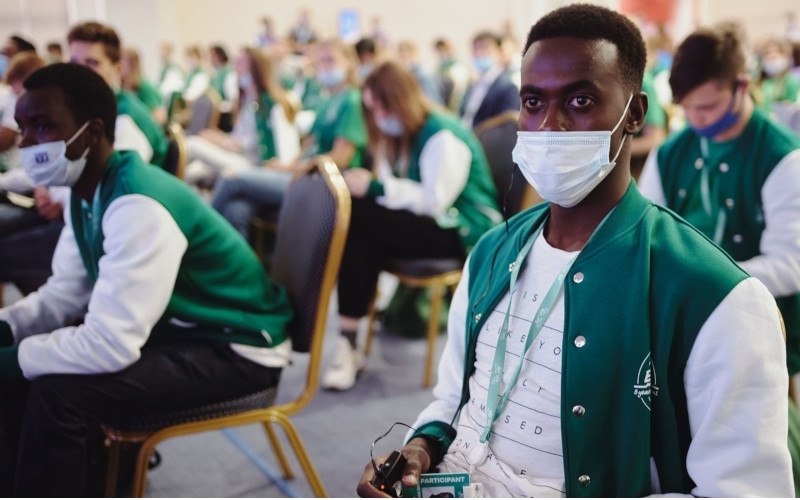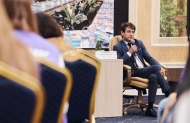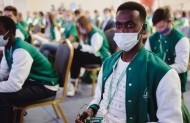
On September 2-8, 2020, the V International Youth Forum “Eurasia Global” was held in the heart of Eurasia, in Orenburg region. This year, for the first time, the forum was organized under the auspices of UNESCO and brought together 500 young people from 50 countries offline and more than 1000 participants from 60 countries online.
This year the master classes program at “Eurasia Global” was formed according to new rules: forum participants pre-voted for those they would like to hear.
The Eurasian Youth Assembly (EYA) was invited to “Eurasia Global” and won the vote. According to independent experts of the forum, young people today are primarily aimed at strengthening dialogue and friendly relations with peers from different countries and continents, regardless of nationality, religious preferences and gender characteristics.
Of course, information space plays a significant role in the development of relations between countries and peoples. EYA successfully held the first meeting of the “Eurasian School of Journalism” at the forum on September 5, 2020. Assembly’s Media Committee members Aigul Niyazalieva (Kyrgyzstan) and Radik Amirov (Russia) shared professional secrets with young people.
“Youth of Eurasia strives for peace and mutual understanding,” said Kristina Tatarnikova, the initiator of the project “Eurasian School of Journalism”, co-Chair of the Coordinating Council of EYA. - First of all, it is necessary to remember the influence of a journalist on a public opinion. In the modern world, with the development of social networks and blogs, we are increasingly faced with such a phenomenon as fake-news. Before publishing materials, you should check the facts, it is also extremely important to cover events from an objective point of view and always remember the responsibility of a journalist to society.”
According to Kristina Tatarnikova, social networks are a unique platform for ”career take-off”. Meanwhile, personal blogs usually lack the censorship that exists in the editorial office: checking the accuracy of facts, excluding the distribution of subjective assessments that distort reality, checking spelling and punctuation in the text before publication. The Eurasian School of Journalism was created on the initiative of EYA to help young journalists and bloggers avoid problems and difficulties that a novice specialist may face. A course of lectures with experts in the field of international journalism and PR technologies will allow to discuss such issues as media literacy, cross-cultural communications, professional responsibility of a journalist, creating high-quality content, and positioning your personal brand in social networks.
Aigul Niyazalieva, a member of the Media Committee of EPA, a journalist and radio host, shared her professional advice with the participants: “For a novice journalist, of course, the main thing is practice. Don't be afraid to write, interview, or create media content. You need to look for your own style, learn how to create high-quality materials and media products. Experts of the Eurasian School of Journalism are ready to share with you the secrets of the profession, their experience, and become your mentors.”
According to the expert, journalism does not stand still; it is constantly changing, social networks are developing, and new formats are becoming more common. In a rapidly changing world, it is important for a specialist to follow media trends, read as many materials from information publications around the world as possible, and constantly study, attend seminars, conferences, and master classes of leading industry experts.
Member of the EPA Media Committee, international journalist Radik Amirov spoke about international projects implemented in the Orenburg region: “It is symbolic that the Eurasian School of Journalism started in the Orenburg region. The region is a crossroads at the junction of Eastern and Western civilizational cultures. Since the XVIII century, Orenburg has become a “window to Asia”, a centre of historical, cultural and religious heritage of the peoples of Eurasia. Prominent journalists, diplomats and public figures lived and worked in the Orenburg region. Hero of the Soviet Union, poet and journalist Musa Jalil was born here, and Karim Khakimov, an outstanding Soviet diplomat and the first Plenipotentiary representative of Soviet Russia in the Arab countries, began his career.”
At the moment, the region is actively working to preserve the memory of outstanding personalities in the history of Orenburg Region. They are a vivid example of professionalism, humanism, loyalty to the Motherland and love for their work. Modern journalists, according to the expert, should write more about the cultural and historical heritage of the peoples of Eurasia, the fate of legendary figures in the history of relations between the countries of the continent, as well as attract young people to preserve historical memory.
For Reference
Eurasian Youth Assembly (EYA)
Eurasian Youth Assembly (EYA) aims to unite the youth of the countries of Eurasia (individuals and legal entities) to represent and protect common interests, achieve socially useful goals in the development of integration processes on the Eurasian continent, form a system of great partnership of the peoples of Eurasia in order to establish on the basis of common spiritual and moral principles of peace and harmony in the Eurasian space through public (people's) diplomacy, culture, science, education and entrepreneurship.






